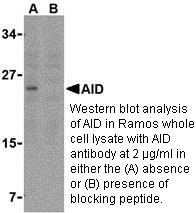Anti-Human Activation-Induced Cytidine Deaminase (CT) (AID)
Data
- -
- -
Antibody DetailsProduct DetailsReactive Species Human Host Species Rabbit Immunogen PN:A302 Product Concentration 0.5 mg/ml Formulation This polyclonal antibody is formulated in phosphate buffered saline (PBS) pH 7.4 containing 0.02% sodium azide as a preservative. Storage and Handling This polyclonal antibody is stable for at least one week when stored at 2-8°C. For long term storage, aliquot in working volumes without diluting and store at –20°C in a manual defrost freezer. Avoid Repeated Freeze Thaw Cycles. Country of Origin USA Shipping Next Day Ambient RRIDAB_2828101 Each investigator should determine their own optimal working dilution for specific applications. See directions on lot specific datasheets, as information may periodically change. DescriptionSpecificity Rabbit Anti-Human Activation-Induced Cytidine Deaminase (AID) recognizes an epitope near the C-terminus of Human and Mouse AID. This polyclonal antibody was purified using affinity chromatography. Background Activation-induced cytidine deaminase (AID) was initially discovered as a homolog of the apolipoprotein B RNA-editing cytidine deaminase 1 (APOBEC1) that showed cytidine deaminase properties in stimulated B cell lines.1 It is necessary for somatic hypermutation and class switch recombination in B cells,2 but inappropriate or dysregulated expression AID is often found in tumors and B cell neoplasms.2,3 Although it is structurally and functionally similar to the APOBEC proteins (reviewed in 4), it appears unlikely that AID deaminates dC to dU residues in HIV cDNA as does APOBEC3G. Antigen DetailsPubMed References & Citations1. Muramatsu, M. et al. (1999) J. Biol. Chem. 274:18470 2. Muramatsu, M. et al. (2000) Cell 102:553 3. Greeve, J. et al. (2003) Blood 101:3574 4. Cascalho, M. (2004) J. Immunol. 172:6513 Technical Protocols |
Related Products
 Products are for research use only. Not for use in diagnostic or therapeutic procedures.
Products are for research use only. Not for use in diagnostic or therapeutic procedures.



